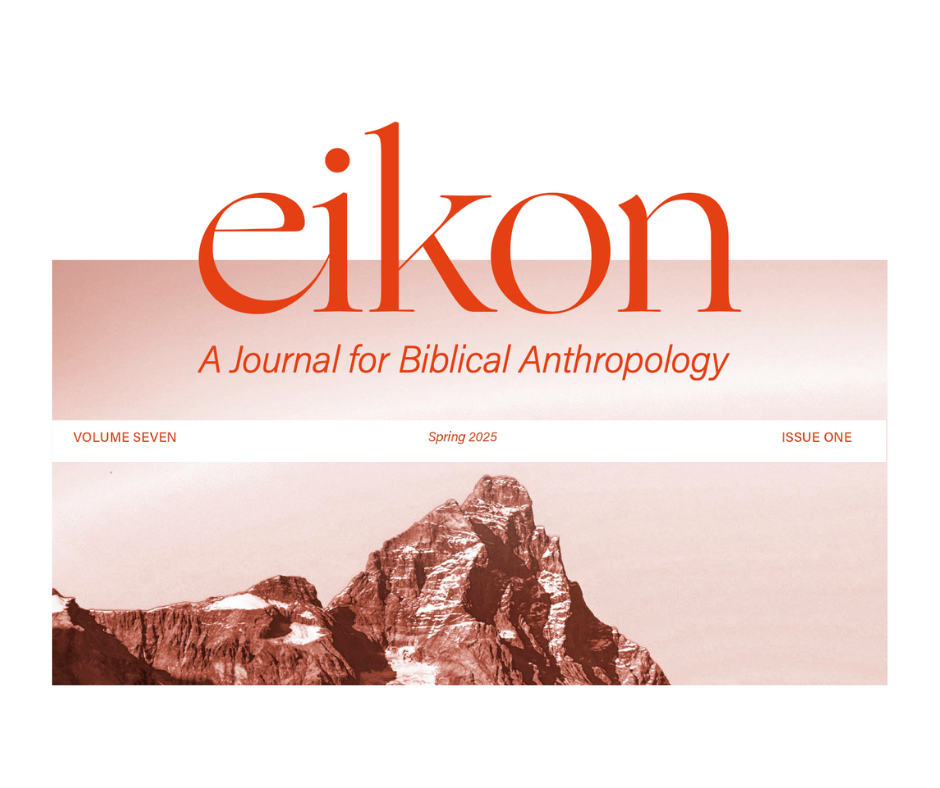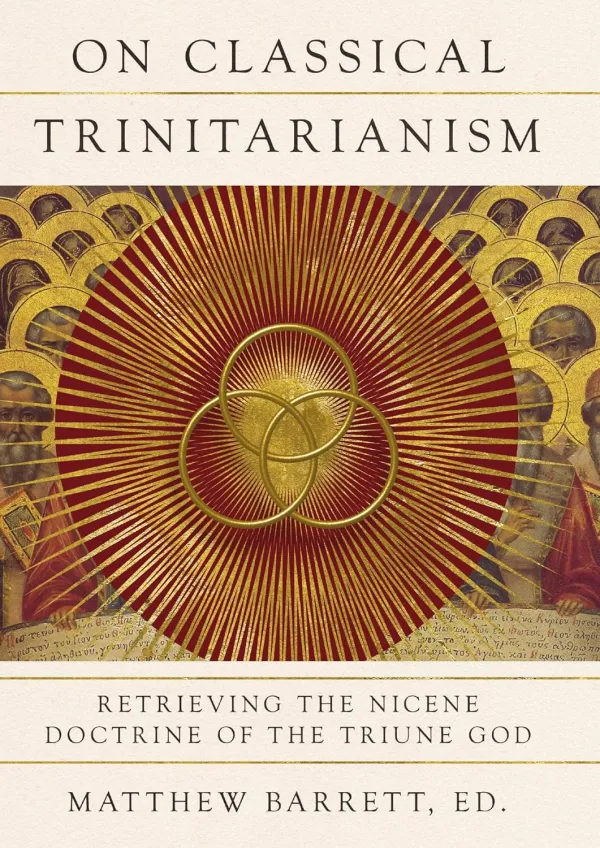The Boundaries of Retrieval: A Review Essay
By: Jonathan Master

Editor’s Note: The following review appears in the Spring 2025 issue of Eikon.
This Review appears in the Spring 2025 Issue of Eikon: A Journal for Biblical Anthropology.
Over the last fifteen years there has been a renewed interest in trinitarian doctrine. This has led to various intramural debates within evangelical circles, some of which have generated more heat than light. Through these debates, doctrines such as divine simplicity, inseparable operations, and divine incomprehensibility have received renewed attention among evangelical scholars and students. This is a welcome development.
In the midst of this recovery and re-assertion, Matthew Barrett, professor at Midwestern Baptist Theological Seminary, has been one of the more prolific writers and spokesmen for classical theism. In perhaps his most significant contribution to date, he has edited On Classical Trinitarianism. This work, not incidentally timed to coincide with the 1700th anniversary of the Council of Nicaea, intended as a resource for future generations, is both a positive statement of classical trinitarianism and a response to the widespread movement toward social trinitarianism, a theological virus which has infected not simply the liberal academy, but also the evangelical theological establishment.
The volume is quite comprehensive and has a wide variety of authors. Multi-author volumes, because of their unevenness and range of perspectives, demand a thorough, careful chapter-by-chapter analysis.
That is not the intent of this review. Rather, its intent is to raise questions that arise from the assumptions of the book. The questions relate to the inclusion, within the trinitarian retrieval movement, of certain theological positions and assumptions.
When we examine both the earliest days of the church and the later mature expressions of Trinitarian dogma, it is clear that there was a constellation of assumptions held by those who articulated the doctrine of God faithfully. Barrett recognizes this as a key feature of any modern retrieval movement, and he addresses these assumptions at the outset:
Moreover, theologians East and West understood that precommitments were instrumental in professing the creed according to its patristic intentions. Some of these precommitments were hermeneutical . . . . Some of these precommitments were metaphysical . . . . Some of these precommitments were theological . . . . Some of these precommitments were canonical.[1]
Barrett goes on to articulate how these precommitments functioned in the early centuries of the church:
The hermeneutical, metaphysical, theological, and canonical precommitments of pro-Nicene trinitarianism may have created many strands, but together they formed a rope that could weather the storm . . . . Confessing the Nicene Creed did not function according to any set of precommitments, but the church fathers endowed churches with those precommitments necessary to interpret and propagate the creed’s content in a way most faithful to the scriptural witness.[2]
Barrett contrasts these precommitments with the species of modern theology against which he is arguing: “Modern theology’s revival has forfeited many of classical trinitarian theism’s precommitments, precommitments necessary to maintain Nicaea’s full integrity.”[3]
This is undeniably true. But, by framing his volume in this way, Barrett also underscores one of the central challenges of his project. Retrieval cannot simply consist of echoing orthodox answers or correcting modern theological errors. Rather, by Barrett’s own criteria, real trinitarian retrieval involves embracing both the answers and the structures of thought embedded in the early Christian witness to the Triune God.
This raises several questions about the current retrieval movement of which Barrett’s book is representative. While the volume is presented as an attempt to represent the current retrieval movement, Barrett’s efforts at codifying this retrieval in fact reveal important fissures in the movement itself.
Roman Catholic Retrieval?
One of these is the prominent inclusion of Roman Catholic scholars in the project. There are vast differences between Roman Catholic and Protestant theology on a range of issues. With respect to classical theism, one might raise questions about canonical precommitments, or perhaps about the precise understanding of the inseparable operations of the Triune God in the salvation of man.
But on this we should note that, in the early Protestant efforts at retrieval, both patristic and medieval categories were often employed — not uncritically, but nevertheless positively. As Muller notes, “The early orthodox development of Reformed trinitarianism assumes the appropriation of patristic norms in confessional documents and is characterized by a flowering of large-scale theological treatments of doctrines like Trinity and Person of Christ.”[4]
As the Reformation spread, newer trinitarian heresies needed combating. The Reformers and those who followed became increasingly comfortable not only with patristic definitions, but also with later medieval ones. Despite some initial reluctance, both the patristic and the medieval trinitarian formulations were heavily adopted among Protestants, even in their mature confessional documents. There were caveats: as Muller notes, Protestant exegesis since the sixteenth century rooted its arguments and terminology more firmly in the text of scripture.[5] But Muller nonetheless summarizes, “The documents and the dogmatic queries of the Reformation, therefore, stand in a direct and positive relationship to the later development of a traditional or classical trinitarian theory by the Protestant orthodoxy.”[6] In fact, in early Protestant retrieval, much of the patristic and medieval framework regarding theology proper was retained.
Feminist Retrieval?
But what about the inclusion of feminist theology? Does this not exceed the boundaries? How is it possible for a modern retrieval movement centered around the doctrine of God to flourish if there is significant hermeneutical disagreement, disagreement on the names of God, or disagreement on God’s self-revelation in Jesus Christ?
In Amy Peeler’s chapter, “The Need for Nicene Exegesis,” we are reminded of just these questions. In her chapter, Peeler argues against the position of Eternal Functional Subordination on both exegetical and theological grounds, only lightly employing her redefinition of the implications of the language of fatherhood. On one level, this is entirely in keeping with the premise of the retrieval project. Eternal Functional Subordination sits uneasily with the classical doctrine of God. But Peeler’s work sits quite uneasily as well.
Peeler’s most notable contribution to the doctrine of God is her 2022 volume, Women and the Gender of God. In her book, she explicitly attempts to bring together the conclusions of modern gender studies with the doctrine of God — a significant hermeneutical departure from the classical tradition.
Her conclusions are also theologically novel. To cite merely one example, in her discussion of eternal generation — surely an important facet of classical trinitarianism — she advocates for multivalent ways of describing the Father’s generation of the Son.[7] In this respect, she positively cites Jürgen Moltmann in his “radical denial of patriarchal monotheism.”[8] Then, along the same lines, Peeler affirms Kathryn Tanner’s suggestion of the use of “gender-bending gender imagery” when referring to God, and concludes, “Addressing the personal and eternal divine source as ‘Parent’ rather than ‘Father’ may more correctly name the relationship.”[9]
It is hard to imagine how this fits with any classical formulations of the generation of the Son; still less with the consistent testimony of Jesus himself or of the names of God in the rest of Scripture. These are not incidental details. Peeler’s theological work has, as one of its aims, undermining a masculine view of God.[10] This is, to put it mildly, a world away from the stated precommitments of classical theological renewal. It is an example of a vastly different, far more glib, way of conceiving of theology proper — a way that would lead someone to write, “That God is Parent or Mother, and not only Father, helps to work against the ‘phallacy’ that God is male.”[11] It is equally difficult to conceive of orthodox precommitments regarding metaphysics that encompass the “fruitful possibility” that Jesus Christ could have been intersex.[12]
Precommitments Matter
Barrett’s book is largely to be welcomed. But care must be exercised in who is identified and placed at the foreground of the retrieval movement which it represents. We cannot forget that retrieving classical trinitarianism involves more than simply stacking up decent answers to discrete questions. The precommitments will always matter. A range of hermeneutical, metaphysical, and anthropological ideas must always be in view.
Barrett, to his credit, acknowledges this in his Introduction. There he looks to the spirit of our fathers:
Ultimately, our aspiration is renewal, the kind that recovers the spirit of our fathers . . . . For we are not concerned with imitating a Trinity remade in our image but contemplating the beauty of the Infinite to participate in the eternal life of the Father, Son, and Holy Spirit.[13]
Matthew Barrett, Ed. On Classical Trinitarianism: Retrieving the Nicene Doctrine of the Triune God. Downer’s Grove, IL: IVP, 2024.
[1] On Classical Trinitarianism: Retrieving the Nicene Doctrine of the Triune God, Matthew Barrett, ed (Downer’s Grove, IVP, 2024) xix [italics in original].
[2] Barrett, On Classical Trinitarianism, xx [italics in original].
[3] Barrett, On Classical Trinitarianism, xxii.
[4] Richard A. Muller, Post Reformation Reformed Dogmatics: The Rise and Development of Reformed Orthodoxy, ca. 1520 to ca. 1725, vol 4: The Triunity of God (Grand Rapids: Baker, 2003) 61.
[5] Muller, Post Reformation Reformed Dogmatics, 62
[6] Muller, Post Reformation Reformed Dogmatics, 71.
[7] Amy Peeler, Women and the Gender of God (Grand Rapids: Erdmans, 2022) 100.
[8] Peeler, Women and the Gender of God, 100.
[9] Peeler, Women and the Gender of God, 100-101.
[10] Peeler, Women and the Gender of God, 112.
[11] Peeler, Women and the Gender of God, 17.
[12] Peeler, Women and the Gender of God, 140 [neologism in original].
[13] Barrett, On Classical Trinitarianism, xxxiv.
